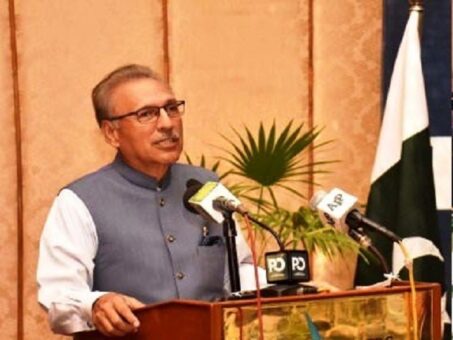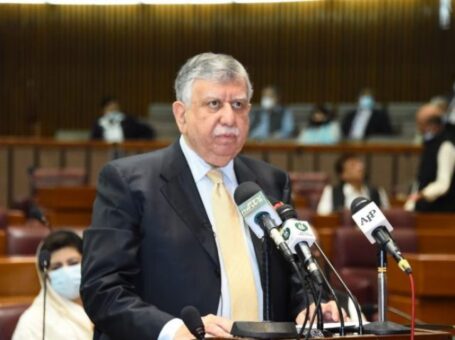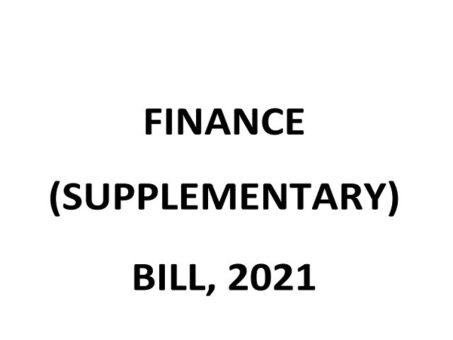PWC A. F. Ferguson & Co. has issued a memorandum to highlight amendments proposed through the Finance (Supplementary) Bill, 2021 which has been laid before the Parliament on December 30, 2021.
It said that through the Bill, certain amendments have been made in the Income Tax Ordinance, 2001; Sales Tax Act, 1990; Federal Excise Act, 2005; Customs Act, 1969 and the Islamabad Capital Territory (Tax on Services) Ordinance, 2001.
The Bill with or without further modification approved by the Parliament will come into force on the next day of assent given by the President of Pakistan.
READ MORE: Mini-budget: FBR to generate Rs4.5bn through tax rate increase on cellular services
The government claims to have presented the Finance (Supplementary) Bill, 2021 as part of prior actions to ensure Pakistan’s sixth review of the $6 billion Extended Fund Facility (EFF) cleared by the IMF’s Executive Board, which is scheduled to meet on January 12, 2022 to decide about the disbursement of a nearly $1 billion tranche.
The government estimates to collect revenues of Rs 375 billion through the amendments proposed in the Bill, out of which Rs 343 billion are expected to be collected from the withdrawal of sales tax concessions.
The Finance Minister has emphasized that most of the sales tax exemptions proposed to be withdrawn are intended to fix the distortions in existing sales tax laws with respect to exemption and zero-rating. He has further claimed that substantial part of the sales tax so collected would not be passed on to the end consumers / common man especially the sales tax of Rs 160 billion expected to be collected from the pharma sector which will be refundable to pharmaceutical companies when claims for zero rating will be filed.
READ MORE: Mini-budget: income tax rates proposed for foreign TV dramas
This claim, however, raises question on the basis of additional tax collections of Rs 375 billion envisaged through the Bill if substantial amount of sums so collected are expected to be refunded / adjusted.
While removal of distortions in the sales tax regime was essential to streamline the process of collection of sales tax under the VAT mode across the board, however government’s over reliance on indirect taxes which has been seen over a period of time, and also witnessed in higher tax collections recently, needs to be rationalised. This over emphasis on indirect taxation is perhaps due to structural imbalance of taxation system of Pakistan which does not allow optimal tax collection and promotes undocumented economy.
A substantial and incremental shift is required to decrease disparity in income and reduce the burden of indirect taxes on common man.
Major sales tax concessions / exemptions withdrawn are as under:
▪ Zero rating of sales tax has been proposed to be withdrawn on various items including
(i) exempt goods if exported by a manufacturer;
(ii) supplies of locally manufactured plant and machinery to manufacturers in the Export Processing Zone;
(iii) supplies to duty free shops.
READ MORE: Mini-budget: Advance tax on motor vehicles doubles
▪ The reduced rate of 12.5 per cent on locally manufactured or assembled motorcars has been restricted to the motorcars having engine capacity up to 850 cc only.
▪ Reduced rate of tax on import of specified plant and machinery is proposed to be withdrawn.
▪ Fixed tax on import of certain cellular mobile phones has been proposed to be replaced by the standard rate of 17 per cent tax.
▪ Exemptions from sales tax on import and supplies of various goods (including capital goods) is proposed to be withdrawn including plant and machinery for export processing zones, goods imported by or supplied to hospitals, machinery and parts for renewable energy, sample or replacement goods.
Apart from the above, some other major amendments proposed through the Bill are as under:
READ MORE: Tax exemptions worth Rs343 billion withdrawn through mini-budget
▪ A clause introduced by the Tax Laws (Third Amendment) Ordinance, 2021 (through which companies were made liable to make their payments through digital modes) has been suspended until it will be notified by FBR. Since its introduction, the implementation of the clause was otherwise being kept in abeyance by FBR through circulars.
▪ Banks are required to provide particulars of bank accounts opened or re-designated during preceding month.
▪ Advance income tax on bills of internet and mobile, and on own money of locally manufactured cars has been increased. FED on import or local supply of certain vehicles has also been increased.
▪ Concept of SPV introduced in the REIT regulations has also been accounted for in the income tax provisions.
▪ Threshold of small manufacturers (not liable to sales tax) reduced from Rs 10 million to Rs 8 million.
▪ Condition of providing CNIC on sale to unregistered persons waived in case payments are made through debit or credit card or digital mode.
▪ Scope of Tier 1 retailers has been expanded to include those subject to income tax withholding under sections 236G or 236H, beyond a threshold.






